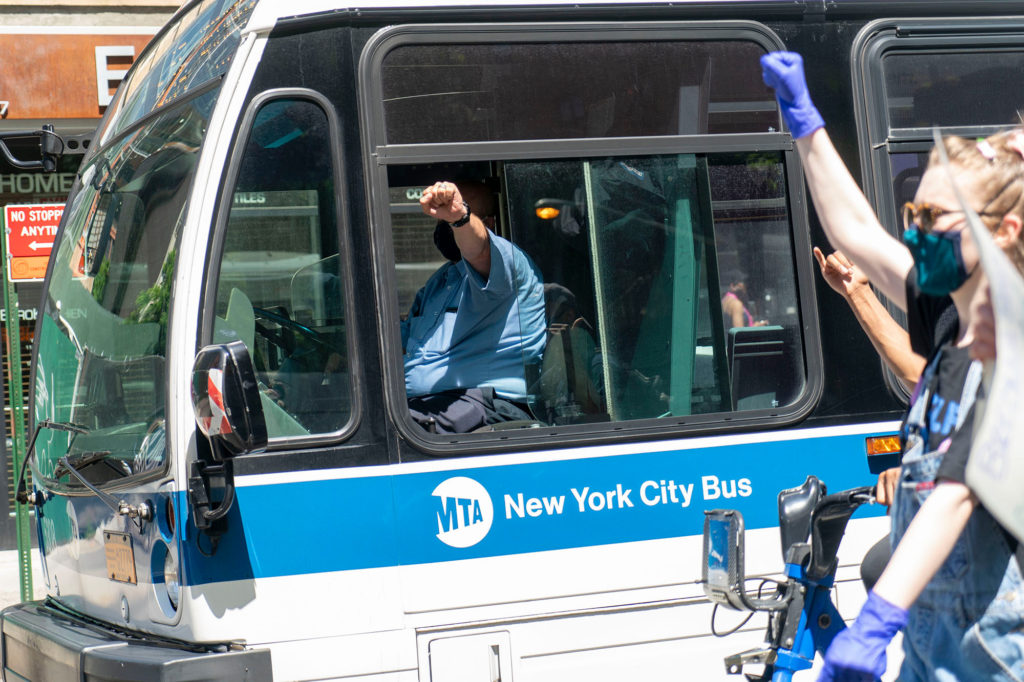The fire at the AFL-CIO was the fire under the ass of all union members. The organized labor movement hasn’t done enough for the Black struggle. That is obvious to everyone who has read the many statements, articles, and interviews of union leaders throughout the country. Beyond a few heroic examples here and there, we have not yet seen much action put behind these words.
The whole might of the labor movement has not yet been brought to bear against the racist system that killed George Floyd, Ahmaud Arbery, Sean Reed, Breonna Taylor, Tony McDade, now David McAtee, and countless others. Not even close.
Of all the press releases following the June 1 demonstration, the best was from the Amalgamated Transit Union Local 689, which asked the question frankly: “What are we doing over the next few weeks to ensure that these workers out in the streets understand that the labor movement stands with them?”
This unemployed union hotel worker has some ideas.
Unions must strike
In 2018 and 2019, nearly a million workers went on strike in the United States. General Motors and Stop & Shop were the big strikes, but teachers walked out too, as well as AT&T workers and workers in the University of California system. These were the pre-Corona days.
Once the pandemic started to pick up, workers began to fight for health and safety measures against Covid-19. Payday Report documents 220 actions by “essential workers” since March 1. The workers who have always been essential started to use their new mantle as “heroes” to call out, walk out, and protest. And though usually small in numbers, these actions represent a growing change in the “common sense” understanding of collective action.
Then there were bus drivers in Minneapolis and New York City who refused to cooperate with the police when asked to transport arrested protesters. This was a stirring act that led their unions and other transit unions throughout the country to pronounce that they will not be the shuttle service for police repression. This is just a small example of labor standing with the movement on the street.
Simply put, things are different now than years ago. Many didn’t believe it, but it’s always been true that unions can strike and win. And more and more workers are turning to the strike weapon as a way to defend themselves and to win gains. If the workers of Minneapolis — the Teamsters, the transit workers, manufacturing, sanitation, the teachers, grocery store workers, cooks, and so many others — went on strike, then guilty charges for all four police officers involved in the killing of George Floyd would be the most basic victory — and we could win so much more. Things like massive cuts to police budgets so that schools, hospitals, and public services can finally get the funding they need. We could even abolish the police if we fought hard enough for it.
Or another example, the subcontracted and poorly paid sanitation workers in New Orleans are still on strike for a raise and proper safety equipment. If their picket lines were bolstered by thousands on the street, then there would be no trash picked up in the hot New Orleans sun and the workers would win handedly. This illustration is even more fitting considering that the bosses are threatening to use prison labor to break the strike. In other words, they are trying to use incarcerated slave labor of a mostly Black workforce, imprisoned by a racist carceral system, to undercut other Black workers. If that isn’t a fight that exemplifies the need to bring together organized labor and the Black struggle, I don’t know what is.
Unions must mobilize membership
The rank and file are already forming labor contingents at demonstrations all around the country. That’s because most workers understand the importance of equality to the labor movement, and will come together to struggle for it. But currently these are ad hoc groups. Unions with their structures and resources can marshall more members to demonstrations. Mobilization is, after all, a political action. Unions, from leadership down to shop stewards, could prioritize the education of the broader membership on the issues of the day. Many unions could use the energy they spend on Get Out the Vote efforts on election days to build political education meetings. They could also build stronger relationships with the community, and union newsletters could open its pages to denouncements of police brutality, articles on the connection between racist oppression and labor exploitation, and more important things than just the next union picnic. Even more basic, unions have the resources to transport people, and sometimes that’s the difference between a few of the most committed labor militants showing up, and wider sectors of the rank and file marching together.
In 2018, a few thousand members of various unions came together for a march against Trump’s immigration’s policies, and it was made easier through the education of the membership, stewards and committee structures of the union, and with buses. If unions support the Black struggle, why would this be any different?
And if unions go on strike, it’s even easier to mobilize.
Unions must utilize their resources for the movement
The protests are inspiring, showing spontaneous rage at the problems of police brutality and racial inequality. No matter what happens, everyone now knows that police precincts burn.
However, for a sustainable movement, greater organization will be necessary. Unions could open their halls for assemblies. Though maligned in the Occupy movement, there is still a need to come together, discuss the issues of the day, and decide, democratically, what to do. Members of the more democratic unions know the importance of well-run meetings and know how to run them.
Besides, in many cities, the only place to hold meetings are churches and union halls, so they might as well take place in the union halls where more workers are likely to participate. Union halls, themselves, should be seen as the natural place for democracy to happen.
The massive monies unions hand over to the Democratic Party for seldom more than soon-to-be forgotten promises can make for a strike fund, a bail fund, or whatever else the movement needs. The betrayals of the Democratic Party are legion, but take Minneapolis, for example, where the Democrats pretty much run the city and still killer-cops kill with impunity. The police forces firing tear gas, trampling protestors, beating them, driving SUVs into them in cities coast to coast, many of them are ordered into the field by members of the Democratic Party. Why give them any more money, when the movement needs it more?
Unions must coordinate
In the absence of active Central Labor Councils — bodies that usually do little more than hold the occasional meeting and release statements — Labor Against Racism committees could be formed in every city as a way to present a workers’ front in the movement. Examples of such coordinating committees, like the Covid-19 Frontline Workers Task Force in NYC or the Connecticut Workers’ Crisis Response (CWCR) were formed at the start of the coronavirus pandemic, and they brought together rank and filers from various unions into regular contact and common action. Since the rebellions started in Minneapolis, members of the Task Force in NYC formed the Socialist Healthcare Workers and put together a powerful statement against police and racist violence that was signed by over 1,500 health care workers across the country. And in Connecticut, the CWCR, which also includes the nonunionized and the unemployed, has joined demonstrations in Hartford and Stamford as a labor contingent.
These could be the start of larger assemblies that bring in other sectors such as tenant unions, mutual aid groups, and organizations of the Black struggle. Unity of unions with the movements in the streets would be a powerful hammer against racism and the capitalist system.
Unions must oppose all cooperation with the police, ICE, and all other repressive agencies
As mentioned above, bus drivers have already taken the initiative against cooperating with the police, and the AFL-CIO of Minnesota has gone as far as calling for the resignation of the president of the independent Minneapolis police union. However, this can be expanded to the disaffiliation of cop cartels everywhere they are connected to local union councils.
The demand for disaffiliation with police unions has found fertile ground in many areas. The next step is ordering police out of the schools, subways, buses, and everywhere else they lurk! Minneapolis public schools have already terminated their contract with the police. And in New York City, a surge in station cops, and the subsequent police brutality against fare evaders and street vendors inside the stations activated a movement last year calling for the removal of the police from the subways and to make fares free. These demands have not yet been taken up by the Transit Workers Union — and it could be a tough argument there since many workers believe the cops protect them — but if they were convinced, the movement would have a powerful ally in the workers who move the millions of passengers of NYC.
We know that the current union leadership won’t initiate any of these proposals, and that’s why it’s the job of the rank and file to fight for them. And if the bureaucracy remains intransigent, the labor movement will find new leaders through the class struggle who will fight for unions to represent the interests of the wider class, not just the membership.
The union leaderships with their heads in the sand must understand one thing. This movement isn’t going to stop anytime soon. And further, if we don’t fight now as part of and alongside the Black struggle, we will still have to fight alone after the pandemic subsides and the economy worsens. When the tax bill for the bailouts lead to austerity cuts and layoffs. When the employers use the tens of millions newly unemployed against us by slashing wages. And when we’re looking down the barrel of that gun, we will wish that we had fought when the time was right.










